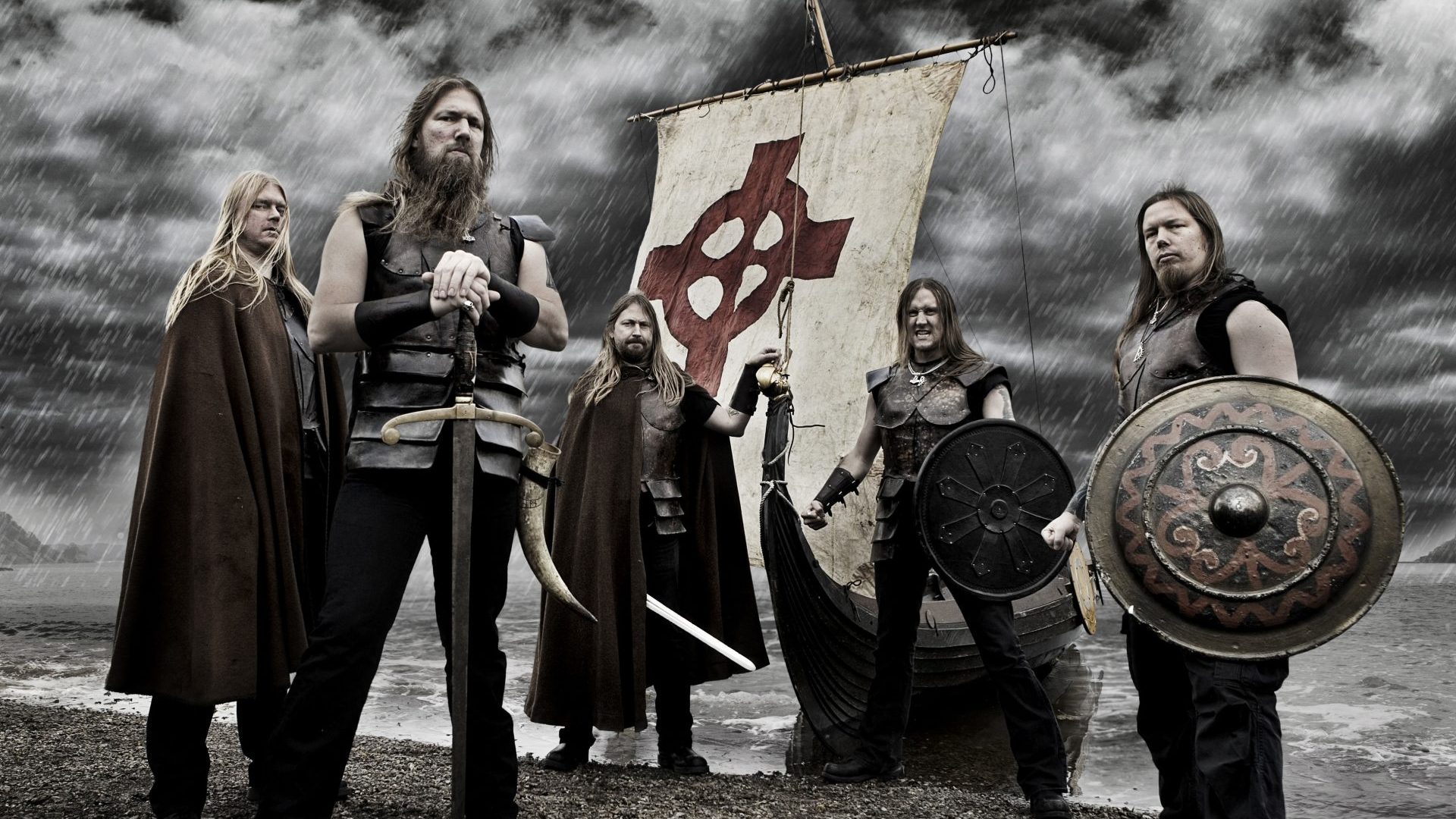When Marcus Garvey wrote, “A people without the knowledge of their past history, origin and culture is like a tree without roots”, he wasn’t thinking about Scandinavians rediscovering their Viking heritage. Yet these are words that resonate for Johan Hegg, frontman of the undisputed kings of Viking metal, Sweden’s Amon Amarth (they release their 12th studio album The Great Heathen Army this week, and are celebrating their 30th anniversary this year). Grimfrost, the replica artefact company co-founded by Hegg, recently used the Garvey quote on their Twitter account alongside a picture of Hegg in full Viking regalia.
Ever since he came up with the band’s first demo Thor Arise in 1993, Hegg has written lyrics that are full of cinematic imagery of raucous mead hall feasts, bloody battles and longships riding the swell, but there’s a remarkable level of historical detail too. Breakthrough LP Twilight of the Thunder God (2008) had a song about the Norsemen recruited into the medieval Byzantine Army, while 2016 concept album Jomsviking concerned itself with little-known Viking mercenaries. Hegg also borrows from sources like the Poetic Edda and the Hávamál (“a great source of philosophical inspiration”, Hegg says).
But Amon Amarth have found that their Viking aesthetic has led to false assumptions about their politics. That Grimfrost include a disclaimer on their website that the company do not “approve the usage of cultural features
or the symbolism of our forefathers in association with white supremacy, racial elitism or other forms of extremism” tells you all you need to know about metal’s darker corners.
Indeed, if Hegg is a Viking, he’s one who is fully paid up to modern Scandi liberal values. When a Kentucky official refused to issue same-sex marriage licences, Hegg got outspoken about his atheism and his “live and let live” attitude on Facebook: “If your moral code comes from a book written by some desert-dwelling, goat-herding nomads between 1400 and 2000 years
ago, you have no authority on what is acceptable in the 21st century.”
And with the outbreak of war in Ukraine, Hegg has done more than most in support of an illegally invaded sovereign nation, from boycotting his beloved UFC mixed martial arts for not banning Russian fighters, to auctioning band memorabilia in support of the UNHCR, and even hosting a refugee family in his own home.
The Great Heathen Army speaks to both the past Hegg so values and the present he is fully engaged in. Musically, it is certainly face-melting, thoroughly rooted in death metal, but the band’s signature melodic guitar riffs leaven the mix, and Amon Amarth must claim the title of the metal band with the greatest inverse proportion of heaviness to anthemic singalongability.
Lyrically, there is plenty of edification. The title track is a history lesson about the coalition of Viking forces that invaded England in the ninth century: “In eight-hundred-sixty-five/ the year of our lord”, Hegg begins, rather like a school master). Saxons and Vikings deals with the battles between King Alfred and the invaders (a guest appearance from Barnsley’s own Saxon makes the whole thing rather meta).
We become students of Norse myth through this album too. Skagul Rides with Me references a Valkyrie of myth, while Heidrun is about the goat in Valhalla that lactates mead. It is, unsurprisingly, a drinking song with a killer chorus and a chanted “Who’s the goat?/ Who’s the goat?” that will be loads of fun live when Amon Amarth kick off their European tour, co-headlining with Machine Head, in the UK in September.
But The Great Heathen Army makes oblique comment on the present we find ourselves in too. Hegg has commented of the barnstorming album track Find a Way Or Make One, “You might be facing obstacles, whether it’s the pandemic or something else, and there are no ways around it, so you have to make a way. That’s what the Vikings did. You can’t stop fighting just because there is something in your way.” Strength in knowledge of the past, indeed.
The Great Heathen Army will be released on August 5 via Metal Blade Records
AMON AMARTH in five songs
Thor Arise (1993)
The rough-edged demo that kicked off the band’s Viking theme, it contained Amon Amarth’s manifesto: “We are Vikings/ Vikings we remain/ It’s in our blood/ Something in our veins”.
The Pursuit of Vikings (2004)
The band’s most-loved song, it contains characteristically vivid imagery: “Oden, guide our ships/Our axes, spears and swords/ Guide us through the storms that whip/And in brutal war!”
Twilight of the Thunder God (2008)
This is Amon Amarth’s barnstorming standard show-closer and one where
they show their familiarity with Norse myth: “Thor! Hlödyn’s son! Protector
of mankind/ Ride to meet your fate, Ragnarok awaits!”
Guardians of Asgaard (2009)
Referencing the realm of the Norse gods, this massive-sounding track had a video featuring lots of snowy Nordic landscapes and plenty of Viking role-playing.
The Great Heathen Army (2022)
The title track of Amon Amarth’s new album recounts the AD865 Viking invasion of England, when “200 ships set sail” with “10,000 warriors from the North”.




